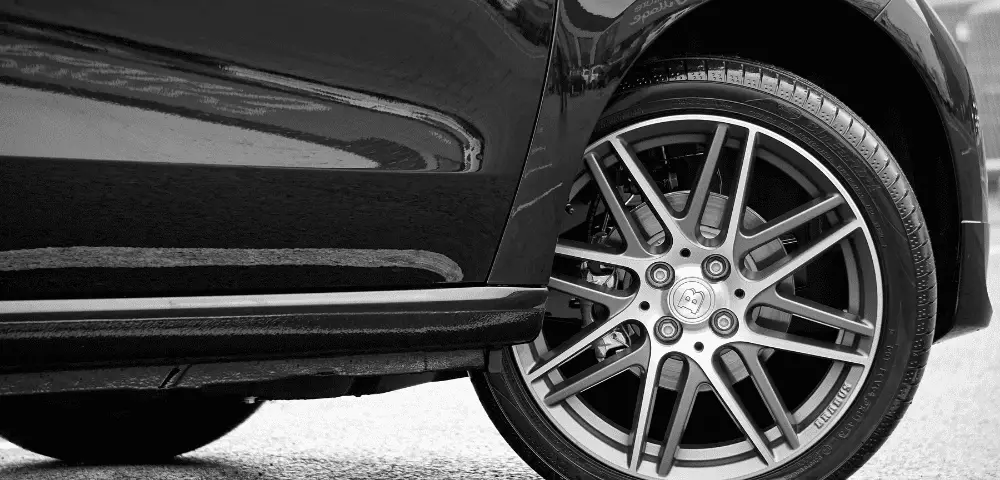Getting new tires might seem like the final step to take to get the perfect ride out of your car. However, many people complain about their cars vibrating after getting new cars.
All cars have numerous components that work together. Even if one of these components is out of alignment, your car will most likely vibrate.
If your car shakes or wobbles, take a look at the following guide to find the root cause of the problem.
Why Does My Car Shake After Getting New Tires?
Generally, any rotating component can cause vibrations.
In a car, as you might have guessed, there are a lot of components that fulfill the criteria. Thankfully, you can determine the severity of the issue by the intensity of the vibrations.
When it comes to vibrations and wobbles after getting new tires, it’s possible that the car hasn’t been perfectly fine-tuned.
New tires need to be balanced individually which leaves a lot of room for errors, especially if you’re doing it yourself.
Moreover, several other factors can contribute to vibrations and shakes.
Depending on your luck, some problems can be solved with a slight adjustment. While other problems, such as an inappropriate tire size for your car or an issue in suspension, can put a dent in your wallet.
Is It Normal for New Tires to Vibrate?
It can be frustrating and worrisome for your car to vibrate especially after purchasing new tires.
But rest assured, vibrations are one of the most common concerns that most new tire owners face. This is because you have to adjust the alignment of your car after installing new tires.
More often than not, people fail to adjust the car alignment as needed. You may need to adjust once or twice to fix this issue.
On the other hand, new tires can also expose pre-existing issues that your old tires were just too worn out to identify such as a bent rim, etc.
Factors That Contribute to New Tire Vibration
Several factors can contribute overall to creating these vibrations. The most common factors are listed below.
1. Bent Rim
The reason why you might be facing vibrations after installing new tires can be a bent rim.
Bent rims are one of the most common causes of car vibrations. This issue could have been hidden due to old tires and only surfaced due to new tires.
You can try to identify whether the vibrations you’re facing are due to bent rims by checking other common signs.
These signs include vibrations when steering or vibrations in your seat, loss of tire pressure constantly, and damage or deformation of tires.
2. How Well Tire Is Fitted on Rim
It’s possible that the new tire is not properly fitted against your rim.
If you haven’t taken accurate measurements of the rim and gotten the appropriate tire for it, then your car would most likely shake during rides.
If so, you would most likely need to either replace the rim or replace the tire.
3. Over or Under Torqued Bolt
Your car can also face vibrations and shakes if bolts and nuts aren’t properly tightened. Whether it is too loose or too tight, both can create a less-than-ideal situation.
Using a well-calibrated tool or contacting an experienced technician can easily help you solve this problem.
4. Tire Construction
There may be nothing wrong with the collaboration of your car but rather the fault lies in the tires themselves.
If you have addressed all other plausible reasons for vibrations, then it’s time you consider whether you have bought a faulty or deformed tire.
The new tires can be constructed with low-quality materials or that might have gotten damaged in transit.
If you’ve bought damaged goods, most well-known tire companies have warranties.
5. Uneven Tire Wear
This is another possible explanation for why your car is shaking or vibrating during rides.
If you have changed one or two tires of your car only, it’s plausible that your car is not properly balanced.
There would be a difference between the old and new tires in terms of threat wear.
It would result in the wheels not meeting the surface evenly, causing the car to be unbalanced. Not only can uneven tire wear shake your car, but it can put additional strain on wheel bearings, suspension, and other components.
Uneven tire wear can also occur if the tires aren’t evenly inflated.
Over or under-inflated tires can create additional pressure either on the center or on the two sides of the tread, resulting in uneven tire wear.
Simply follow the ideal tire pressure recommended by the manufacturer and check your tire pressure often to prevent this problem.
What can I do to fix the new tire vibration?
Depending on what is causing your car to shake, you can take several steps to address the issue and fix it.
If it’s a bent rim, simply changing the tire rim could solve the issue.
If it is the construction of the tire itself, either purchasing new good quality tires or checking in the warranty of the tire with the manufacturer would be the appropriate step.
For other possible factors, a visit to your local technician might be the only step you’ll need to take.
Final Thoughts
Vibrations in a car can be concerning and dangerous in some cases.
However, it happens due to very small and avoidable issues in most cases.
This is especially true if you are experiencing a sudden increase in vibrations after replacing your tires. The best way to avoid that is by staying careful during installation.
Try to ensure that you are replacing all 4 tires together or at least in pairs.
Moreover, you also need to ensure that all your wheels are properly balanced and aligned and the rim is in perfect condition.
The checklist of things to do while replacing the tires is small and manageable. Follow it and you’ll be saved from the hassle of coming back to the workshop in a couple of days.


